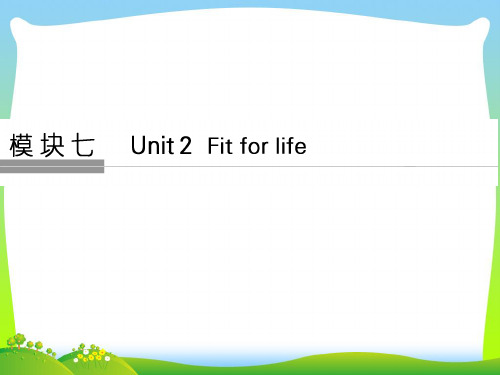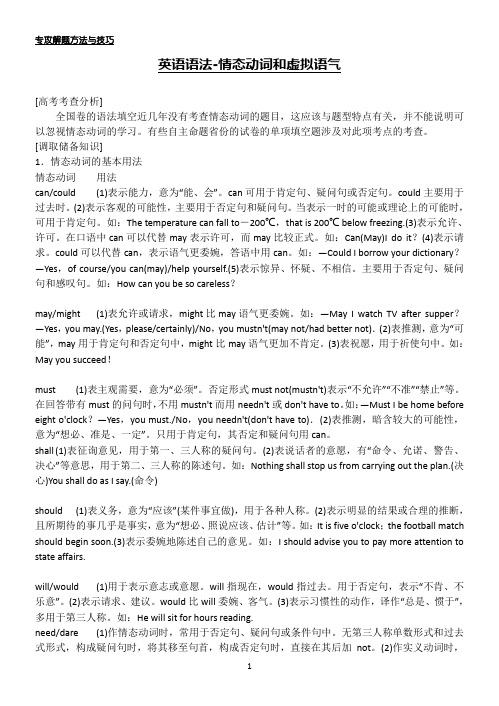高三英语译林(江苏专用)一轮复习课件:第2部分专题7情态动词和虚拟语气
2020版高考英语一轮复习第二部分语法专题七情态动词和虚拟语气课件牛津译林版

6.need和dare的用法 need和dare既可用作情态动词,也可用作实义动词。用作情态动词时,主要 用于否定句和疑问句。 —Need I come? ——我需要来吗? —Yes,you must. ——是的,你必须来。 You needn’t telephone him now. 你现在不必打电话给他。 She dare not go out alone at night. 她晚上不敢一个人出去。
Since nobody gave him any help,he must have done the research on his own. 既然没有人帮助他,他一定是独自做的研究。 Could he have left the work unfinished? 他会丢下工作不干了?
2.表示“与过去事实相反”
过去本不应该做某事但实际上做了 过去本来想做某事而没做 过去本不愿意做某事而做了
—The taxi driver is to blame for the serious accident. ——出租车司机应为这起严重的事故负责。 —I can’t agree more.He shouldn’t have drunk. ——我非常赞同。他本不应该喝酒的。(已经喝了) You needn’t have watered the flowers because it would rain soon. 你本不必浇花的,因为很快会下雨的。(已经浇了) I would have helped you but I was busy at that time. 我本来想帮你可是当时很忙。(没有帮)
①用于第二、三人称的陈述句中,表示命令、许诺、警告、强制、威胁等,此 外,颁布法律、法规时也用shall。 You shall have a new bike for your birthday. 你会得到一辆新自行车作为生日礼物。 The new law shall come into effect next month. 新法将于下个月生效。
高考英语一轮总复习优化课件(江苏专用)七、时态和语态(牛津译林版)

解析:选D。考查时态。答句中的then 指代的是at five tomorrow afternoon, 此处意为“明天下午五点那个时候他 将正在开会”,故应用将来进行时。
要点浓缩 1.现在进行时 现在进行时表示说话时正在发生着的 一个动作;表示现阶段但不一定是发 生在讲话时的一个动作;表近期特定 的安排或计划;go,come等表示起止
(2)be going to表示将来的情况。人作 主语时表示打算做某事;物作主语时 表示客观迹象表明马上要发生的动作 或存在的状态。 Look at the sky.It looks as if it is going to rain.看看天空,看起来快要下雨 了。(客观迹象表明要发生的动作)
2.将来时用于特殊句式 祈使句+and/or...将来时句子。 Put everything where they were before or the librarian will punish you. 把东西放在原来的位置否则图书管理员 会惩罚你。
B.don’t;would
C.don’t;will
D.didn’t;will
解析:选 D 。第一空的“不知道”应该 是过去不知道,现在已经知道了,要用 一般过去时。be going to和will都可以表
示将要发生的动作,be going to往往表示
事先已计划或思考过的事情,而will常表
示临时作出的决定,因此选D。
A.has played
C.plays
B.played
D.is playing
解析:选D。句意:那首音乐听起来
十分熟悉。谁在楼上弹钢琴?本题考
查时态。根据句意可知,本句说的是
现在的事情且动作尚未完成,故用现
2025届高三英语一轮复习语法虚拟语气课件

3.would rather 专题
would rather sb. did 宁愿让别人做一件事(虚拟语气)
My mother always tells me that she would rather I were happier. I feel upset today,so I would rather you invited me to dinner tomorrow.
虚拟语气
目录
CONTENTS
01 什么是虚拟语气 02 虚拟语气的一般用法 03 虚拟语气特殊用法
什么是虚拟语气
虚拟语气表示与事实相反或虚假的,难以实现的 情况,有时也表示主观愿望,建议或某种强烈情
感,也用虚拟语气 -.跟真的相差的远
虚拟语气的一般用法if
①如果你是我眼中的一滴泪,我就永 远不会哭泣。
只需要把已经写好的句子时态变成它的过去式就好了
If you were a tear in my tears,I would never cry. If I was a dog last night,I could sleep in bed with you. 过去式还有过去式嘛?过去完成时 Had+done If I had been a dog last night,I could sleep in bed with you. sleep→slept 对吗 错误
3.would rather 专题
would rather do sth.than do sth. 宁愿做某事而不做某事(不是虚拟语气)
I would rather marry an old lady than stay with you.
江苏省灌南高级中学高三英语一轮复习《虚拟语气》课件 译林牛津版

将来时相反
___g_o__t ____ If he _w_e_r_e__to__g_e_t a full mark this term,
_s_h_o_u_l_d__g_e_t I _w_o_u_l_d_h__o_ld__ a birthday party for him.
Mark: 100
高考链接
wish, as if /though以及 if only 的虚拟形式:
这几个词(词组)表虚拟时,其后所用的虚拟形式与条 件从句基本相同,即比陈述语气中的时态后退一个时态。
时间
谓语动词虚拟语气
现在 did(be 多用were)
wish /as
if/though 过去 had + done
/if only
A. would have been saved B. had been saved
C.will be saved
D.was saved
〖解析〗根据句子的倒装特征判断此处是省略 了if的虚拟语气, 原形是:If I had known
about this computer program, a huge amount of time and energy . 故选择A。
错综时间条件句
If it were Sping Festival today, we would have bought some presents last weekend.
注意 从句和主句的时间不一致时,按照各
自的时间用相应的时态。
①假如你接受了我的意见,你现在就会好的多。 You___w_o_u_l_d_f_ee_l___ much better now if
+should / would / could / might + have done 表达,故选D。
高考英语一轮复习:第二讲-情态动词和虚拟语气省公开课获奖课件市赛课比赛一等奖课件

(3)would 能够表达过去旳习惯性动作,比used to正式, 但没有“现已无此习惯”旳含义。 When we worked in the same firm several years ago, we would often go to the cinema together. 当几年前我们在同一家企业工作时,我们经常一 起去电影院。
1.can 和could旳使用方法 (1)表达“能力”。
— No one can be compared with Yao Ming in playing basketball. — Oh, you are really his big fan.(摘自2023湖南高考) ——在打篮球方面,无人能与姚明相媲美。 ——你真是姚明旳铁杆粉丝。
2.(2023·北京高考)— I don't really like James. Why did
you invite him?
— Don't worry. He ________ come. He said he wasn't
certain what his plans were.
A.must not
Simon's party last night?
— I wanted to, but my mom simply________not
let me out so late at night.
A.could
B.might
C.would
D.should
解析:考察情态动词。 问话人问询为何昨晚没有参 加Simon旳聚会,答话人回答说自己想去,但是妈妈 只是不想让自己在这么晚旳时候出去。 此处表达旳 是过去旳意愿,所以用would。 答案:C
2019版一轮英语译林版课件:语法部分 第七讲 情态动词和虚拟语气 精品001

be able
to give you more help now.
6.Jack is a great talker.It's high time that he do something instead of just talking. 答案:Jack is a great talker.It's high time that he sh∧ould或ddiod something instead of just talking. 7 . Mary remembers everything exactly as if it happens yesterday. 答 案 : Mary remembers everything exactly as if it
not
have
finished
the
program in time. 5.Maybe if I have studied science then,I would be able to give
you more help now.
答案:Maybe if I
have had
studied science then,I would
forward.Sometimes I wish I can make it stop.In the chaos of these changing times,my grandmother gave me numerous sweet memory that I can hold on to.I may not always know I'm going,but I will always know where I came from.To me, that was a source of great strength.
高三英语一轮语法复习情态动词和虚拟语气课件

1. 对现在或将来的推测(结构:情态动词+do) 情态动词可以用来表示对现在或将来的情况进行推测 She could be lost. 她可能迷路了。 注意 如果是对现在或未来正在发生的事情进行推测,可以使用“情 态动词+be doing”结构。 My friend may be still sleeping at home now. 我的朋友现在可能正在家里睡觉。
(2)表示推测,表示“肯定,一定”之意,此时,must只用于肯定句。在否定句 或疑问句中,用can / could。
(3)表示“偏偏,非要,硬要”,有时表示不巧,有时表示固执,
通常都是指令人不快的事。
4. shall的用法
(1)用于第二、三人称,表示说话人的命令、警告、强制、允诺、威胁或 决心等。
考点3 “情态动词+have done”表示责备的语气
可用于表责备语气的情态动词有:should, ought to, could, might, need等,它们常被用来表示说话人对过去事情的不满或遗憾,带 有较强 烈的责备语气,其结构为“情态动词+have done”。
1. should(ought to)have done“本应该……” 表示过去应该做而(实际)没有做的事情,含有责备或遗憾的语 气,其否定形式为“should not/ought not to have done”。should have done 还可以用来表示惊讶、赞叹等情绪 2. could/might have done “本来能够(会)……” 表示过去本来能够(可以)做某事,但实际上没有做到。 3. need+have+done “原本需要做……” 表示本来需要做某事而没有做,“needn’t+have+done”则表示“本来 不必做某事而做了”。
高三英语(译林版)一轮课件:专题7 名词性从句

如果她明天来,我们就举行晚会。
________________________________________________________ _If__s_h_e__c_a_m_e_/_s_hould come/were to come tomorrow,we would hold the party.
Without air(=If there were no air),there would be no living things. 没有空气,便没有生物。 I was ill that day.Otherwise,I would have taken part in the sports meeting. 那天我病了。要不然的话,我会参加运动会的。 注意 虚拟条件句中有had,should,were时,可以将if去掉, 然后把had,should,were提到主语前面,形成部分倒装。
实相反的
(2)should+动词原形 /could+动词原形
假设
(3)were to+动词原形
If he were here now,we would have the meeting. 如果他现在在这儿,我们就开会。(与现在事实相反) He would have passed the driving test if he had taken your advice. 他如果采纳了你的建议,就会通过驾驶考试的。(与过去事实相 反) If it rained/should rain/were to rain tomorrow,they would not go out for a picnic. 如果明天下雨的话,他们就不去野餐了。(与将来事实相反)
题组训练2
用所给词的正确形式填空
2018届高三英语译林版(江苏专用)一轮复习第2部分专题7情态动词和虚拟语气

高三一轮总复习
【即时训练 2】 用 may,might 的适当形式填空 1.—I don't really like James.Why did you invite him? —Don't worry.He might/may not come.He said he wasn't certain what his plans were. 2. —I left my handbag on the train, but luckily someone official. —How unbelievable to get it back! I mean,someone might have stolen it. gave it to a railway
高三一轮总复习
5.will 和 would 的用法 (1)will ①表示请求、建议,常用于第二人称。 Will you please go with me? ②表示意愿、决定、允许。 I will never do that again. ③表示习惯性动作或某种倾向, “总是,惯于”,通常用于第三人称。 Rosa will always be late for school.
高三一轮总复习
用来表示一种估计的 should 情况“按理会/估计 会”should do should have done
肯定句、 否定句、 疑 问句
高三一轮总复习
情态动词+have done 的用法 (1)should have done 表示“本来应该做某事而实际上未做”,而 shouldn't have done 则表示“本不应该做某事而实际上做了”。 You should have told me about it earlier. You shouldn't have said such words to your parents. (2)ought to have done 也表示“本应该„„”, 而 ought not to have done 则意 为“本不应该„„”。 You ought to have told me about it earlier. You ought not to have said such words to your parents.
高考英语(江苏专用译林)大一轮复习课件:模块七+Unit+2

②carry out 实行 ④break out 爆发 ⑥give out 分发;耗尽
❷“be+形容词+about”短语总结 ①be cautious about 对……小心 ②be concerned about 为……担忧 ③be particular about 对……挑剔 ④be crazy about 对……疯狂 ⑤be curious about 对……好奇
9.Both sides hoped to reach an agreement,which would be ________ to each side.They expected it could promote economic exchanges and deepen cooperation in development so as to ________the two peoples.(benefit)
needed for ________ (apply).
6.The drug is so ________ that he is ________ to it.Therefore, it’s hard for him to get rid of the ________ to it.(addict)
hard. 4.________ burglars.If you see anything suspicious , call the
police immediately. 5.Attention was ________ what was needed to obtain the required
exercise is an ________ (effect) way to get rid of anger. 4.This argument sounds ________ (reason) , but actually it’s
江苏省牛津译林版英语2020届高考一轮复习情态动词与虚拟语气专题精讲(word版)

专题一:情态动词与虚拟语气情态动词的用法一、情态动词的语法特征。
情态动词和助动词一样,都是辅助性的动词,用来帮助构成不同的时态和语态,表示说话者的某种情态,没有人称和数的变化。
情态动词主要有can, may, must, could, might, shall , should, will, would, ought to, need, dare等。
1、情态动词不能表示正在发生或已经发生的事情,只表示期待或估计某事的发生。
2、情态动词除ought 和have 外,后面只能接不带to 的不定式,即动词原形。
3、情态动词没有人称,数的变化,即情态动词第三人称单数不加-s。
4、情态动词没有非谓语形式,即没有不定式,分词等形式。
二、情态动词的基本用法。
1、can, could(1)表示能力,意为“能,会”:The smallest good habits can make a big difference.[福建] It was several minutes before I could take in what he was saying.[湖北](2)表推测,意为“可能”,用于否定句或疑问句中,can比could语气强:This can’t/couldn’t be done by him.(3)表示请求或允许,在疑问句中可以用could代替can,语气更委婉。
Could I use your phone,please?(4)表示理论上的可能性。
Always believe that good things are possible,and remember that mistakes can be lessons that lead to discoveries.(5)用于否定句或疑问句,表示惊异、怀疑、不相信等态度。
He can’t do this. / Can this be done by him?(6)用于固定习语中:can’t...too/enough表示“无论...也不为过”;can’t help doing sth表示“禁不住做某事”:You can’t be too careful while driving. / Hearing the story,I couldn’t help laughing.【易混易错】can和be able to的区别:(1)都可以表示能力,有时可以互换。
情态动词和虚拟语气+讲义 高三英语一轮复习

英语语法-情态动词和虚拟语气[高考考查分析]全国卷的语法填空近几年没有考查情态动词的题目,这应该与题型特点有关,并不能说明可以忽视情态动词的学习。
有些自主命题省份的试卷的单项填空题涉及对此项考点的考查。
[调取储备知识]1.情态动词的基本用法情态动词用法can/could (1)表示能力,意为“能、会”。
can可用于肯定句、疑问句或否定句。
could主要用于过去时。
(2)表示客观的可能性,主要用于否定句和疑问句。
当表示一时的可能或理论上的可能时,可用于肯定句。
如:The temperature can fall to-200℃,that is 200℃ below freezing.(3)表示允许、许可。
在口语中can可以代替may表示许可,而may比较正式。
如:Can(May)I do it?(4)表示请求。
could可以代替can,表示语气更委婉,答语中用can。
如:—Could I borrow your dictionary?—Yes,of course/you can(may)/help yourself.(5)表示惊异、怀疑、不相信。
主要用于否定句、疑问句和感叹句。
如:How can you be so careless?may/might (1)表允许或请求,might比may语气更委婉。
如:—May I watch TV after supper?—Yes,you may.(Yes,please/certainly)/No,you mustn't(may not/had better not).(2)表推测,意为“可能”,may用于肯定句和否定句中,might比may语气更加不肯定。
(3)表祝愿,用于祈使句中。
如:May you succeed!must (1)表主观需要,意为“必须”。
否定形式must not(mustn't)表示“不允许”“不准”“禁止”等。
在回答带有must的问句时,不用mustn't而用needn't或don't have to。
译林牛津版新课标高考一轮总复习第部分情态动词和虚拟语气教案英语 解析版

情态动词和虚拟语气也是高考英语非常重要的一个语法项目。
毋庸置疑,熟练掌握其用法对于语篇的准确理解大有裨益。
另外,在书面表达中恰当地运用情态动词和虚拟语气,则会使文章语言地道,在彰显考生丰厚英语功底的同时,成为吸引阅卷教师的有力法宝。
命题趋势:在高考试卷中偶尔会出现在语法填空和短文改错中,常考查情态动词的基本用法;“情态动词+have done”结构中have done, 或是虚拟语气的基本用法。
考点一can,could与be able to的用法1The police still haven't found the lost child,but they're doing all they can.警察还没有找到那个丢失的孩子,但是他们正在竭尽全力地寻找。
(现在的能力)2If you have a good sleep,you will be able to solve this problem.(将来的能力)如果你好好睡一觉,你将能够解决这个问题。
3The fire spread through the hotel very quickly but everyone was able to get out.(过去有能力做并且成功地做了某事)尽管这场大火迅速蔓延到了整个宾馆,但是每个人都逃了出去。
4I could have worked out the problem,but I was too nervous.(本来有能力做但未做)我本来可以解决这个问题,但我太紧张了。
5How could you do such a silly thing?(表示惊讶)你怎么能做这样的蠢事呢?⑥Can I have a word with you?It won't take long.(表示请求)我可以和你谈谈吗?不会花很长时间的。
[规律总结]1.表示现在的能力:can,am/is/are able to。
高考英语二轮总复习 第一部分 语篇型语法填空和短文改错 专题七 情态动词和虚拟语气

译文 一家慈善机构正在为一所小学募捐,小学里的孩子们的生活条件不好。 就在几天前,一场关于关心孩子的演讲在中心公园里举行。来自该慈善机 构的演讲者呼吁政府官员在改变孩子的生活环境方面做出挑战。同时,他 们还建议市民们创造更多机会来培养孩子的良好性格。每个人都应该为 给孩子提供一个美好的童年做出贡献。孩子们同我们的未来息息相关,他 们肯定会为我们对他们的关心而做出善举的。
情态动词 意义及用法
例句
must have to
(1)必须,应该(表示主观要求); (2)肯定,想必(肯定句中表示主观推 测); ★(3)非要,偏偏(用于疑问句或条件 状语从句中) 注意:(1)mustn’t表示禁止,意为“不 准;不许”; (2)当must用于疑问句中时,其否定回 答是:No,...needn’t/don’t have to.
3.(2019·天津卷改编)The professor warned the students that on no account ___s_h_o_u_ld______they use mobile phones in his class. 解析:句意:教授警告学生们在任何情况下都不能在他的课上使用手机。on no account“在任何情况下都不……”。否定短语置于句首引起部分倒 装;warn后面的宾语从句中要使用虚拟语气:should+动词原形。
2.(2020·天津卷改编)Jim says we ____c_a_n_______stay in his house as long as we leave it clean and tidy. 解析:句意:考查情态动词。句意:吉姆说只要能够让房子保持干净、整洁, 我们就可以住在他的房子里。can表示许可,意为“可以”。
情态动词和虚拟语气-高三英语一轮复习牛津译林版(2020)

my mother would take me to Disneyland
表示习惯性动作,意为“总是”,
will/would will指现在,would指过去
at weekends.
我仍旧记得我快乐的童年,那时我妈妈经
常在周末带我去迪士尼乐园。
表示征求意见或提出请求,多 Will/Would you please let me have a look
表示礼貌地请求,意为“能,可 Can you tell us your recipe for happiness
can/could 以”。在疑问句中could可代替 can, 语气更委婉
and a long life?你能告诉我们你幸福和长 寿的秘诀吗?
I can’t thank you too much for all your
3. What a pity! You missed the sightseeing, or we _w__o_u_ld_/_c_o_u_ld__h_a_v_e__h_a_d_(have) a good time together. [解析] 句意:多么遗憾!你错过了这次游览,否则我们就可以一起度过一段愉快 的时光了。根据关键词or可知,这里表示与过去的事实相反,谓语应用would have had或could have had。 4. If we _h_a_d__c_a_u_g_h_t_(catch) the flight yesterday, we would be enjoying our holiday on the beach now. [解析] 句意:如果昨天我们赶上了那趟航班,我们现在就正在沙滩上享受我们的 假期了。If从句表示与过去事实相反的假设,用过去完成时。
译林牛津版高二英语虚拟语气用法总结课件(共33张)

He hesitated for a moment before kicking the ball, otherwise he _____ a goal.
A.had scored B.scored C.would score D.wou用 1,It’s necessary/strange/natural/important/
Should it rain tomorrow,…….
3.If you had studied hard before, you would have passed the exam. Had you studied hard before,……
________ it rain tomorrow, we would have to put off the visit to the Yang Pu Bridge.
would sooner had rather would as soon
+宾语从句中
与现在或将来事实相反 过去时 动词过去式/were
与过去事实相反 过去完成时 had done
I would rather you _c_a_m__e_(come) here now. I would rather you _c_a_m__e_(come) here tomorrow.
陈述语气 虚拟语气
He insisted that he h__a_d_n_’_t_s_t_o_le__n(not steal) the money . He insisted that he _(s__h_o_u_l_d_)_b_e__s_et (set) free.
3.在 would rather 宁愿 would prefer
If you __h_a_d_s_tu_d_ie_d_(study)hard before, you _w_o_u_ld_b_e_(be)a college student now.
- 1、下载文档前请自行甄别文档内容的完整性,平台不提供额外的编辑、内容补充、找答案等附加服务。
- 2、"仅部分预览"的文档,不可在线预览部分如存在完整性等问题,可反馈申请退款(可完整预览的文档不适用该条件!)。
- 3、如文档侵犯您的权益,请联系客服反馈,我们会尽快为您处理(人工客服工作时间:9:00-18:30)。
专题七情态动词和虚拟语气(2)表示猜测“可能”,一般用于疑问句和否定句。
—Can the news be true?—It cant be true.Someone is knocking at the door.Who could it be?(3)can可以表示理论上的可能性,指常有的行为或情形,意为“有时会……” Anybody can make mistakes.(4)表示请求、允许(表请求时,口语中常用could代替can使语气更委婉, 旦答时用can)。
;;;\ \ f 8 Can I go now?—Could I come to see you tomorrow?—Yes, you can.(否定答语可用No, I'm afraid not.)慈⑶表示惊异、怀疑、不相信的态度(主要用于否定句、疑问句或感叹句中)。
How can that be true? I can't believe my eyes and ears.How could you be so careless?(6)can的特殊用法。
can but只有;can't but不得不;can't...too再怎样也不为过/越越好I can but wait.I cant but wait.You can't be too patient to the customers.【即时训练1】用can, could, be able to的适当形式填空1 ・Though the building was on fire, they were able to go out safely.2.It cant be the postman at the door.Ifs only six o'clock・3.—How f s your new babysitter?—We could not ask for a better one.All our kids love her so much.4・The police still haven't found the lost child, but they!re doing all they can5 ・You caift be too careful when driving.2.may和might的用法⑴表示允许、请求,might比may的语言更委婉一些。
—May I watch TV now?—Yes, you may.(Yes, please.)—No, you mustn't.(No, you f d better not.)(2)表示可能性时,might比may的可能性小,may表示的可能性比can小(主要用于陈述句、肯定或否定句,疑问句用can代替)。
;( The story may not be true.'(3)表示祝愿(不用might) ;;;;;;;May you succeed!(4)may/might as well 最好还是. ,不妨You might as well do it now.(5)may/might well 很可能He may well be late for class.【即时训练2】用may, might的适当形式填空1 ・—I don f t really like James.Why did you invite him?—Don't worry.He might/may not come.He said he wasn't certain what his plans wee2. —I left my handbag on the train, but luckily someone gave it to a railway official.—How unbelievable to get it back! I mean, someone might have stolen it.3・As a student, you might/may as well make good use of your time.4・You may go to school either by bike or by bus.5. May she rest in peace.3.must, have to 和ought to 的用法:(l)must表示“必须,应该,一定要”。
强调主观看法,只有现在时形式J 否定式是must not(mustn't)0 must开头的问句,其否定回答要用needn't或don't have to 代替。
⑵must表示必然的结果。
I I I I IAll men must die.(3)must还可表示主语固执、偏要做他人不希望做的事。
;It can f t help; he must do that.(4)have to着重客观需要,能用于更多时态(过去时或将来时)。
; He will have to be there before ten.(5)oughtto表示义务和责任,"应该”,[比should语气要强。
1 5You ought to take care of yourself.4.need和dare的用法'(l)need表示“需要,必要”,只能用于否定句利疑问句。
在肯定句中,常用must和have to代替。
;(2)dare表示“敢”,通常用于否定句、疑问句利条件状语从句中。
;Dare you go home alone at eleven in the evening?(3)need和dare的特殊用法I I I I I ―①need表“需要”时,可用want, require代替。
I I The desk needs to be repaired./The desk needs repairing.②dare作实义动词时,在肯定句中要接to,在疑问句和否定句中to 可省去。
He dares to catch a snake・I do not dare(to)complain.Do you dare(to)swim in the river?【即时训练3】同义句改写1 ・He daren't go out at night. He doesn't dare to go out at night.2. The flowers need watering. The flowers need to be watered.5.will和would的用法(l)will①表示请求、建议,常用于第二人称。
;;;;Will you please go with me?②表示意愿、决定、允许。
I I I I I II will never do that again.③表示习惯性动作或某种倾向,“总是,惯于”,通常用于第三人称。
Rosa will always be late for school.(2)would①表示请求、建议,比Will委婉,指现在时间,多用于第二人称。
Would you like a cup of tea?②表示过去习惯性动作或某种倾向。
I I ] IWe would play badminton on Sundays.6.shall 和should 的用法(l)shall用于第一、三人称,在问句中表示征求对方意见或请求。
Shall I come in?用于第二、三人称的陈述句中,表示命令或威胁。
; You shall do as your father says.(2)should①表示责任、义务,意为“应该” °1111②表示惊讶语气,意为“竟然”。
丨I I I : You should wear slippers in class.③用于虚拟条件句,表示“假如,万一”,省去if, should可提至句首Should you be late,叩ologize to the teacher.7.情态动词表示推测或判断的用法下表即是表示推测的情态动词使用的场合:情态动词+have done的用法I (l)should have done表示“本来应该做某事而实际上未做"I而shouldn't have done则表示“本不应该做某事而实际上做了”。
;;You should have told me about it earlier.You shouldn't have said such words to your parents.(2)ought to have done 也表示“本应该”,而ought not to have done 则意为“本不应该……”。
I Illi I You ought to have told me about it earlier.You ought not to have said such words to your parents.(3)needn f t have done表示“本不必要做某事而实际上做了”。
You needn't have walked so quickly since time was enough・I (4)could have done表示“本来有可能而事实上未做到”。
11I could have come on time, but my car broke down on the way.(5)may/might have done表示“过去可能发生过某事”或“本来应该或可以做某事(实际上没做)” o ! ! ! ' ' !You might have given him more help, but you were so busy.【即时训练4】1.I could have helped you(我本来可以帮助你的),butl was too busythen.2.Its Simd呼He cant have gone to school(不可能上学去了).3.You know the story very well.You may/might have read it(可能读过)before.4.You must have gone to bed late(—定是睡得很晚)last night.Your eyes are red.5. I should/ought to have done my homewoi ・k (本应该做作业)last night, but I went to the cinema.♦感悟高考1. (2016•北京高考)1 love the weekend, because I ____get up early on Saturdays and Sundays.A ・ needn'tD. shouldn't【解析】考查情态动词。
